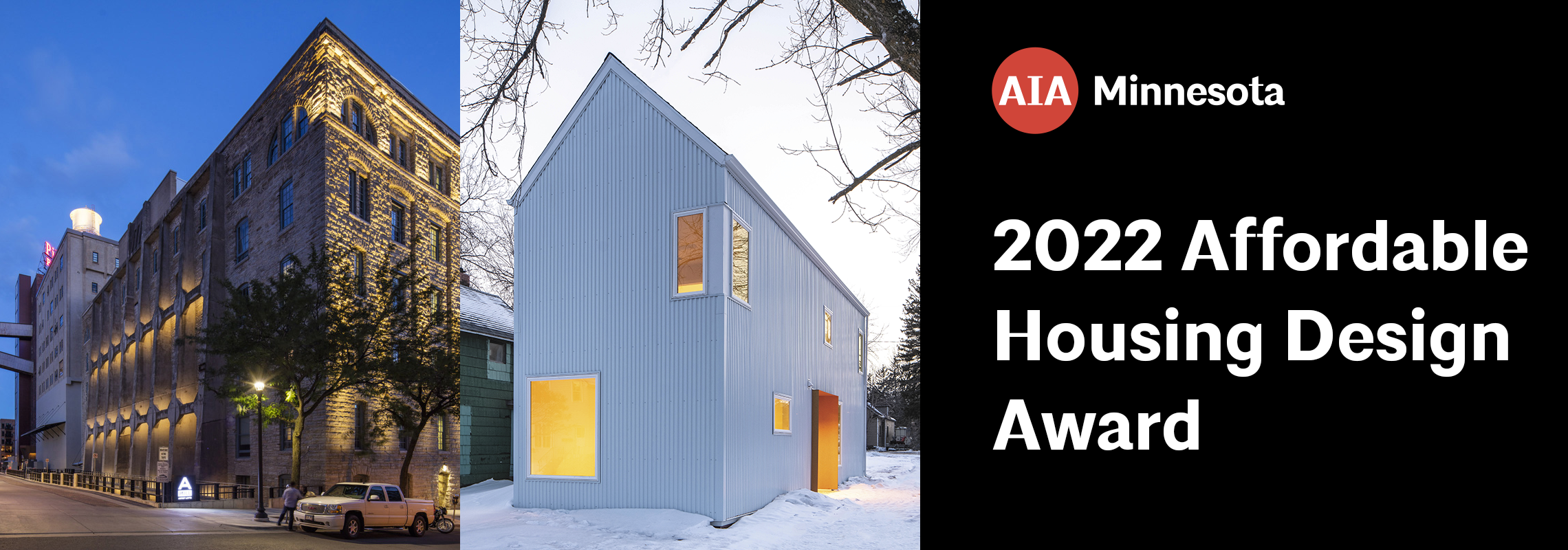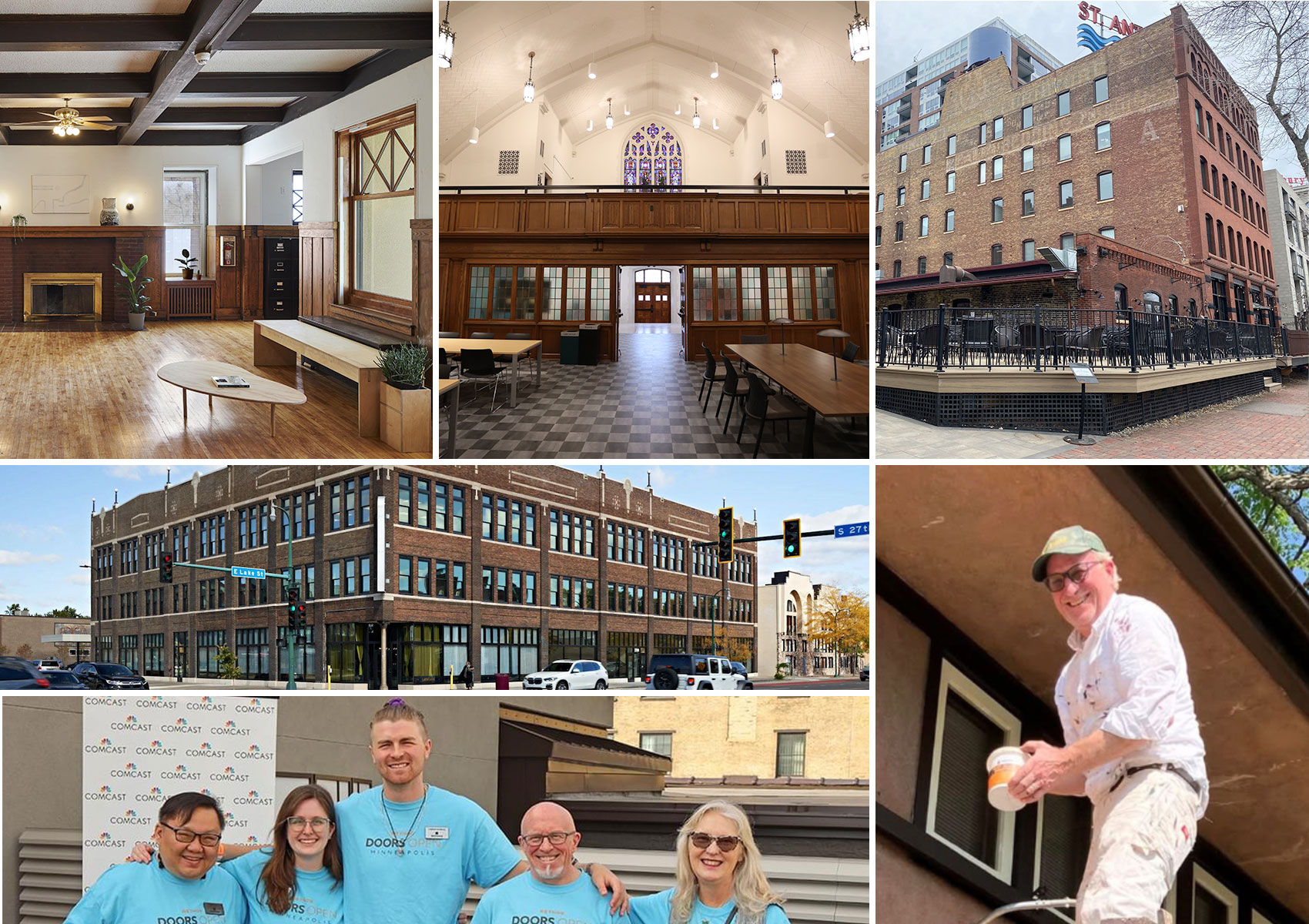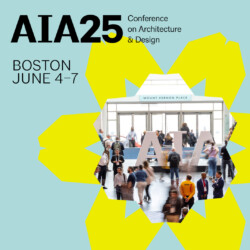Image of A-Mill Artist Lofts by Troy Thies Photography. Image of Duluth Infill House by Dan Jandl.
MINNEAPOLIS, OCTOBER 13, 2022 – AIA Minnesota and the McKnight Foundation proudly announce that A-Mill Artist Lofts and the Two-Level Infill House are the winners of the 2022 Affordable Housing Design Award.
A-Mill Artist Lofts nurtures artistry by providing meaningful and affordable homes for all local artist types while helping invigorate the neighborhood and preserve one of Minneapolis’s most revered and treasured historic landmarks. The design was driven by a respect to preserve and celebrate the historic character of the buildings while creatively inserting new uses, cleaning up hazardous materials within the site, showcasing historic relics, adapting existing waterways tunnels, integrating state-of-the-art studio space and infrastructure for the artists, designing community gathering spaces, and providing a long-term, sustainable approach to the complex’s use through preservation, along with energy generation from existing infrastructure and natural resources.
The Two-Level Infill House models how to develop narrow lots thoughtfully and affordably. It is a prototypical, affordable single-family residence that was designed to fit the narrow lots in Duluth that have recently become developable due to a zoning change. The architects developed a barbell plan in which a full-width room occupies each end of the house and the services are concentrated at the center. The primary entrance is on the side of the building where resources were concentrated to make one exquisitely crafted moment in an otherwise simple, minimal envelope.
Recognized for A-Mill Artist Lofts is Dominium, developer; BKV Group; architect; Weis Builders; US Bank; Cornerstone; Enhanced Historic Credit Partners; Dougherty & Company LLC; Affordable Housing Partners; Hennepin County; Minneapolis City of Lakes; Winthrop & Weinstine; Braun Intertec; HDR; Minnesota Department of Natural Resources; Minnesota Historical Society; MacRostie Historic Advisors; National Park Service; Federal Energy Regulatory Commission; Hess Roise; Loucks; Kennedy & Graven Chartered; Minneapolis Park & Recreation Board; Stinson LLP; Commercial Partners; Sustology; Wiss, Janney, Elstner Associates, Inc.; Marcy-Holmes Neighborhood; MacDonald & Mack Architects; St. Anthony Falls Heritage Board; and Schuler Shook.
Recognized for the Two-Level Infill House is One Roof Community Housing, developer; Office Hughes Olsen, designer; 1LLC, contractor; the Duluth Department of Planning and Economic Development; and the Duluth Economic Development Authority.
All of the award submissions were reviewed, and the recipient projects selected, by an esteemed panel of nationally recognized affordable housing experts, including John Burke AIA, of Studio Twenty Seven Architecture, Washington, DC; Trisha Girdwood, AIA, of LBBA, Chicago; Dean Kralios, of SMR Architects, Seattle; Ceara O’Leary, AIA, of the Detroit Collaborative Design Center; and Kate Tunney, Assoc. AIA, of Rothschild Doyno Collaborative, Pittsburgh.
Jurors noted the inventive solutions and striking architecture of both of these distinctive projects. They recognized the strength of each project within the size and program constraints, noting that A-Mill presents an excellent example of historic preservation and adaptive reuse, while the Two-Level Infill House provides a template for creative use of challenging infill sites.
Jurors were instructed to evaluate award submissions using the following criteria:
- How creatively and successfully has the project responded to the needs of the client and the population served? How responsive is the project to demographic shifts and regional housing needs for affordable housing?
- Community connection. Was the project developed through a strong, collaborative project team? Did it show participation from the larger public, including neighbors, future users of the building, or citizens at large?
- Long-term asset. Did the project provide a long-term asset to the client, occupants, and the community? How did design contribute to the project’s long-term financial and social viability? Did design choices support community interaction and enhance community networks?
- Excellent design quality. Did the project demonstrate exceptional design quality—responsive to physical and social contexts as well as to any constraints imposed by funding and regulatory agencies?
Jurors gave extra consideration to projects with deep affordability, and to those that demonstrated high performance in the AIA Framework for Design Excellence principles.
Award recipients will be featured throughout the year and receive their award at the annual 2022 AIA Minnesota Awards Celebration on December 2.
Learn more about the award program »
See all the past Affordable Housing Design Award recipient videos »
The American Institute of Architects Minnesota, founded in 1892, is dedicated to strengthening our communities, improving our built environment and providing exceptional design. For more information on the organization and Minnesota architectural firms, reference our Web site at www.aia-mn.org, visit www.facebook.com/aiaminnesota.
The McKnight Foundation, a Minnesota-based family foundation, advances a more just, creative, and abundant future where people and planet thrive. Established in 1953, the McKnight Foundation is deeply committed to advancing climate solutions in the Midwest; building an equitable and inclusive Minnesota; and supporting the arts in Minnesota, neuroscience, and international crop research.



